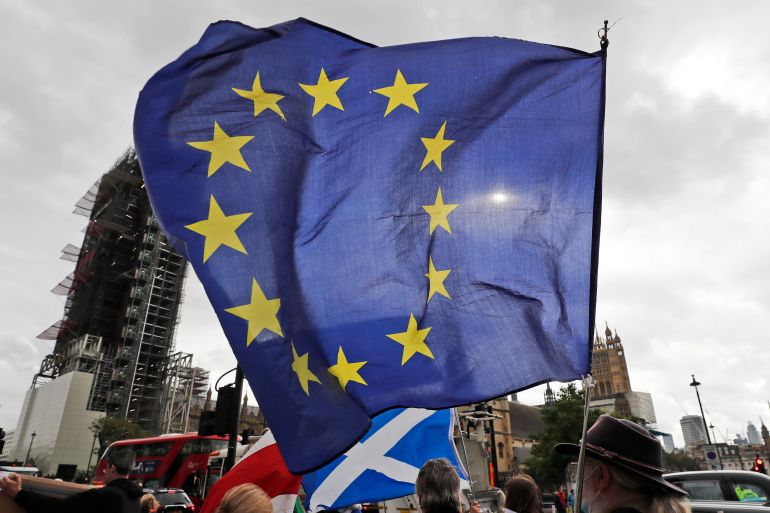Brexit brinkmanship: UK, EU tell each other to move on trade
Talks on a trade deal are deadlocked, but European Parliament liberals expect agreement will eventually be reached.

The United Kingdom and the European Union said on Monday the door was still open for a deal on their post-Brexit relationship, calling on each other to compromise to find a way to protect billions of dollars of trade between the neighbours.
With just more than two months before the UK ends a status-quo transition arrangement with the EU, talks on a trade deal are deadlocked, with neither wanting to move first to offer concessions.
Keep reading
list of 4 itemsWhy are British farmers pleading for a universal basic income?
Northern Ireland agreement could end deadlock, restore government
Forced to become British: How Brexit created a new European diaspora
A no-deal finale to the UK’s five-year Brexit drama would disrupt the operations of manufacturers, retailers, farmers and nearly every other sector – just as the economic hit from the coronavirus pandemic worsens.
European Commission Vice President Maros Sefcovic repeated on Monday the EU still wanted a trade deal but not “at any cost” after British Prime Minister Boris Johnson said on Friday there was no point in continuing talks.
“It has to be a fair agreement for both sides – we are not going to sign an agreement at any cost,” Sefcovic told reporters after meeting Michael Gove, Britain’s point man on the existing divorce agreement, in London.
“The European Union is ready to work until the last minute for a good agreement for both parties,” Sefcovic said.
The UK, increasingly frustrated by the EU’s refusal to start text-based talks, called on the bloc to make the first move, with its housing minister saying Brussels only had to make “some relatively small but important changes”.
Housing Secretary Robert Jenrick called on the EU to “go that extra mile, to come closer to us on the points that remain for discussion”.
A spokesman for Johnson again ruled out prolonging any negotiation beyond the end of this year, when the transition period runs out, saying the EU “must be ready to discuss the detailed legal text of a treaty in all areas with a genuine wish to respect UK sovereignty and independence”.
EU chief negotiator Michel Barnier had been due in London for talks with British counterpart David Frost this week. Instead, they will now speak by telephone on Monday to discuss the structure of future talks, Barnier’s spokesman said.
Negotiations broke down on Thursday when the EU demanded the UK give ground. Issues still to be resolved include fair competition rules, including state aid and fisheries.
EU diplomats and officials cast Johnson’s move as a frantic bid to secure concessions before a last-minute deal was done, and European leaders have asked Barnier to continue talks.
British officials have repeatedly said any deal has to honour the UK’s new status as a sovereign country and not try to tie it to EU rules and regulations.
German Chancellor Angela Merkel said compromises on both sides would be needed. French President Emmanuel Macron said the UK needed a deal more than the 27-nation EU.
The UK is launching a campaign this week urging businesses to step up preparations for a no-deal departure. In a statement accompanying the launch, Gove says: “Make no mistake, there are changes coming in just 75 days and time is running out for businesses to act.”
More than 70 British business groups representing more than seven million workers on Sunday urged politicians to get back to the negotiating table next week and strike a deal.
“With compromise and tenacity, a deal can be done. Businesses call on leaders on both sides to find a route through,” they said.
Meanwhile, the liberal faction of the European Parliament expects a post-Brexit deal to be struck, despite Johnson’s threats to break off talks.
The agreement would, however, likely be “minimal”, they said.
“Beyond all these political games by Boris Johnson, I think, finally we will have a minimal agreement,” liberal party group Renew Europe leader Dacian Ciolos said on Monday.
Ultimately, a deal was in the interest of both sides, he said. The UK would be more strongly affected by a no-deal scenario, Ciolos said.
Speaking of the British leader, Ciolos said he was “very unpredictable”.
“I don’t know if he really knows what he wants,” he said.